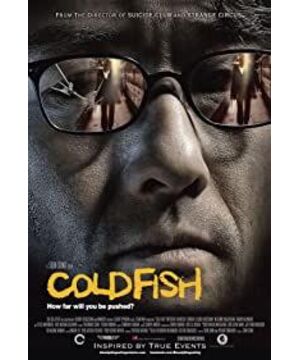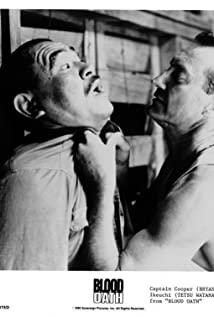To Americans after World War II, the Japanese were like another species. Because they are too incomprehensible, they are both conservative and like new things, modest and polite but stubborn and cruel in war, docile on the surface but not easy to obey control. After the almost perverted Pacific War, it only needed an order from the emperor to give up resistance.
For this contradictory character of the Japanese, I think "Icy Tropical Fish" has done a good interpretation.
Kindness culture
Japanese culture particularly emphasizes "grace". For Japanese people, getting help from others—that is, "grace" means that they are owed to others and must be repaid in time to make themselves feel at ease. Of course, this is easy to understand, because human relations also exist in China, and our country also emphasizes that "the grace of dripping water should be reciprocated by springs."
However, this kind of repayment mentality in Japanese culture is very extreme. The kindness of the Chinese is the great kindness of others. Often the subtext is that the benefactor is virtuous and does not seek anything in return, but for the Japanese, kindness must be repaid. Yes, it also makes grace a heavy moral burden. The Japanese often say "reverence and fear" when they are helped by others, which is explained in the Japanese dictionary as follows: You have received a special favor, and you feel ashamed and ashamed, because you are not worthy of receiving such a favor, so you use this The word expresses your shame when you are graced.
In "Icy Tropical Fish", the male protagonist has been "enjoyed" many times by the bad old man, such as solving the problem of his daughter's stealing, helping the male protagonist's daughter with her work, and planning to help the male protagonist's tropical fish business. In "Chrysanthemum and the Sword", it is said that for the Japanese, it is very annoying to be suddenly favored by someone who is unfamiliar. (P95 "Chrysanthemum and the Knife" Commercial Press) It's just that even though the male protagonist is psychologically burdened with the burden of repaying the bad old man, his own lack of ability forced him to accept help from the bad old man in an emergency situation at that time. Even after taking the burden of debt for the first time, the next request from the bad old man is some form of "repayment" for the male protagonist.
So when the bad old man murdered, the male protagonist did not choose to call the police immediately, not only because of his own cowardice, but also because of the inherent "repayment plot" in Japanese culture that made him reject the option of calling the police. After a series of murders, it may be that the male protagonist was deterred by the bad old man and lost his sobriety and ability to deal with it.
Politeness and humility are taken for granted in the culture the male protagonist accepts. It's just that the moral attributes in Japanese culture are too extreme and completely incompatible with the sadism in the male protagonist's blood. So for a man like the hero who should be wild, being humble and polite is self-harm and erasing his own nature. Living in that culture, there are no other options, and external moral requirements make him self-attack, which is to constantly deny the occasional bad thoughts in his mind, in order to convince himself that he is not that kind of abuser, so he is more than ordinary people. Demonstrate greater tolerance and kindness.
But this kind of patience and politeness is disguised, it is to resist the original intention of the heart. So when faced with this kind of behavior like the bad old man did, he burst out with strong aggression and murderousness. With glasses on, his eyes were indifferent, and a few smears of blood added to the corners of his square face made him look gloomy. This is also a bit of the meaning of "homophobia is the closet".
Filial piety culture
In Japanese culture, filial piety is very important. However, the disobedience and disobedience of the male protagonist's daughter is too strong, completely beyond the boundaries of rebelliousness. Treating the stepmother and father is completely without the filial feeling of the Japanese in our impression. He directly insulted and satirized the stepmother, and never gave the family a good look from the beginning to the end.
Thinking from our normal logic, the daughter may be rebelling against a nasty stepmother and a lecherous father, coupled with the ignorance of the male protagonist who pretends to be a good person, so her bad girl characteristics become more and more fueled. .
But her violent disobedience actually has the legitimacy of Japanese culture itself.
For the father of a Japanese family, the head of the family, they enjoy the highest priority of everything in the family, such as the first to hold the chopsticks for meals; the first to bathe in the bath; the family salutes him, and he only has to nod. But this privilege is not so much a dictatorship, but rather an obligation to the children. The father must be responsible to everyone in the family and maintain the honor of the family. In the eyes of the children, one of the most important aspects of this honor is that the father should restrain his lust and not marry another stepmother after the death of his wife.
That is, the father is obliged to maintain his ideal image in the minds of his children. "No matter how much sacrifice he made to be kind to his daughter, in the future, he should not take credit for it and use it to 'justify his current behavior'." (P103 "Chrysanthemum and Sword" Commercial Press) Japanese are very I hate people who think they are right to help me because I hate being obliged to repay others. Out of aversion to "repaying kindness," the "gender" in their culture is often the morally weaker party. This also explains why the daughter in Japan, which attaches great importance to filial piety, is so rebellious, because the father failed to maintain his own image and was not responsible for the family. The head of the family is really a fool.
revenge plot
For the Japanese, being insulted or ridiculed is a serious thing, no less than being attacked personally. So in their tradition, "revenge" is a good thing to clear the name of. It could even be said that it is a moral obligation to take action to de-stigmatize one's own reputation.
We often see the Japanese commit suicide by cutting their belly at every turn. In fact, cutting the belly is a very sacred thing. It is to prove one's innocence and restore one's honor by means of self-destruction. Suicide is also a very meaningful and honorable thing. Americans, on the other hand, see suicide as meaningless, but as despair and give up resistance. This reminds me of the attitudes of the two masters of existentialism towards death. Heidegger believes that death is the necessity for us to seek our own authenticity, and "being" is to seek authenticity in "to be born to death". And Husserl believed that "death is an atrocity, attacking me from the outside and destroying my plan." For Husserl, death is the negation of life; in Heidegger's eyes, death is the meaning of life a part of.
It looks like the Japanese should prefer Heidegger.
Alright, far away.
In fact, the male protagonist's psychological route of revenge is somewhat difficult to observe. Especially for people from non-Japanese cultural contexts.
The Japanese especially hate competition. Everyone in the world will burst out with stronger motivation because of competition. Only the Japanese have wilted in the competition. (It's not absolute, it's said in "Chrysanthemum and the Knife", I don't fully agree.) "They are very sensitive to their competitors, as if it is a violation of themselves, so they turn their attention to the relationship with the aggressor. instead of concentrating on work." (P139 "Chrysanthemum and Knife" Commercial Press)
For them, failure is the most shameful. And competition is the premise of failure, there is no failure without competition. But what if the competition does happen and you lose yourself? The Japanese are crazy about honor, they are extremely sensitive to self-esteem. The way to deal with failure is, of course, revenge.
Chrysanthemum and Dao Li told a story, a big name asked three retainers to guess the forger of a famous sword, and then the guy named "Shan San" guessed that the forger of the knife was "Muramasa", and the other two retainers All guessed wrong. Both Jiachen felt insulted, so determined to take revenge, and finally killed "Shan San".
Yamato Nation is so exciting.
In "Icy Tropical Fish", the most conspicuous is the comparison of the two fish restaurants. The bad old man's fish shop is big and luxurious, and there are many hot female shop assistants to solicit business; on the other hand, the male owner's small shop is maintained only by himself and his wife, and it is located in a remote place.
In contrast, shame is self-inflicted.
This is the first moment when the male protagonist is insulted, but the male protagonist is a good person who pretends to be "humble and polite", and naturally the assassination and revenge behavior in the above story will not happen. But the seeds of revenge are planted, and if the bad old man is not aggressive, this kind of seed may die. But what the bad old man did was to give the male protagonist the seed of revenge in mid-spring rain and mid-summer sunshine, and this seed of revenge grew wildly. It hit the fake in the male protagonist's heart again and again, and finally broke through the ground and stabbed the sky at the last moment, and the stench of blood stained the screen red.
Later, the male protagonist raped his wife, slapped the disobedient female, and committed suicide to apologize. It was so natural.
He finally became what he should have been, a brave and cold person. Of course, I don't mean that the male protagonist is brave to kill (it sounds like killing is a good thing...), but that his reaction to the environment is brave.
Although he has only been himself for a few short hours, he has finally realized himself.
Therefore, this film should be a story about the life of a man who was repressed. This repression stemmed from the incomparable respect for morality, the incomparable emphasis on reputation, and finally erased his nature by pursuing or being forced to pursue vain things. , completed self-castration.
Shame is shame, and ultimately loses one's soul.
View more about Cold Fish reviews











